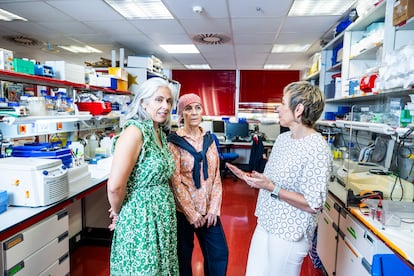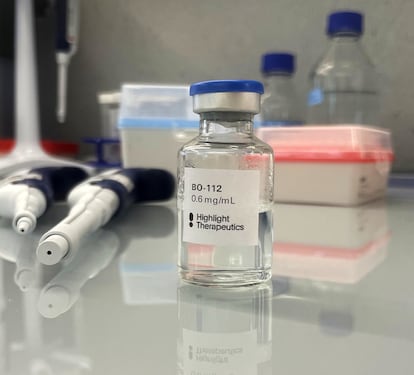The odyssey of three women and BO-112, the molecule that tricks cancer

Juana Santiago vividly remembers the day at the beach when her daughter stared at her and exclaimed, “But Mom, how awful! What is that?” Santiago’s wet hair revealed strange spots on her scalp. Her dermatologist knew it as soon as he saw them: melanoma. Metastatic melanoma. It was 2017, and Santiago, a finance professor at Camilo José Cela University, turned to her doctors for treatment for her cancer. The worst news came soon after: nivolumab, a drug that has saved hundreds of thousands of lives , wasn’t working for her. The tumor continued to spread across her scalp, despite fifteen surgeries and a massive skin graft from her arm. Santiago walks through the halls of the National Cancer Research Center (CNIO) in Madrid on this summer day and stares, entranced, at the bland cover of a scientific journal hanging on the wall. It is the discovery that has made me cancer-free for almost two years.
Biologist Marisol Soengas , head of the CNIO Melanoma Group, speaks with frustration about the days when people went to the beach covered in carrot oil, without any sunscreen. Melanoma used to be a rare disease, but the now-fashionable tanning trend has caused cases to skyrocket, especially among fair-skinned people. The incidence in Spain has risen in two decades from 12 to 15 new cases per 100,000 people per year. The World Health Organization expects around 100,000 deaths worldwide by 2040, almost 70% more than this year. Melanoma is a cancer that begins in melanocytes, the cells that produce the pigment that gives skin its color. “A tan is a response to damage,” warns the biologist, a Coruña native born 57 years ago in A Aldea do Monte, a town of 25 inhabitants in Pontevedra.
Soengas's group made a momentous discovery in 2008. His team was testing a multitude of chemical compounds to see if any would get cancer cells to digest themselves, a phenomenon known as autophagy. One day, a tireless postdoctoral researcher, Damià Tormo , went to Soengas's office and excitedly announced that one worked. It was BO-110, a synthetic RNA molecule, the genetic material of many viruses. The compound tricked tumor cells into believing they had been infected by a virus and induced self-digestion, also attracting the attention of the body's defenses, like a terrorist who loses his camouflage and falls into the hands of the police, according to a comparison Soengas made. On August 4, 2009, when half of Spain was at the beach or in the pool getting a tan, the discovery was published on the cover of the specialized journal Cancer Cell .

Juana Santiago and Marisol Soengas team up to tell their story to EL PAÍS for the first time, along with Marisol Quintero, the pharmacologist who leads Highlight Therapeutics , the company created in Paterna, Valencia, to develop the experimental drug. It's a venture with very few precedents in Spain. The company has already secured around €45 million in funding and has achieved promising results in seven clinical trials with more than 150 participants with different types of cancer.
Soengas's office, lit by large windows with spectacular views of the Cuatro Torres skyscrapers on Paseo de la Castellana, is filled with trophies, such as the Fritz Anders European Medal, reserved for outstanding scientists in melanoma research. "I'm very proud of many awards, but the most exciting thing has been meeting Juana. When I was five years old, I already wanted to be a scientist, but I never would have thought that my results would reach a patient," proclaims Soengas, who announced a year ago that she also has a tumor , breast cancer, which is responding well to treatment.
The biologist recalls with vertigo the day in 2010 when she and Damià Tormo went to a notary's office to create the company, which was initially called Bioncotech Therapeutics and was split 60% for him and 40% for her. It was the first company to emerge from the CNIO. Soengas recalls with a laugh that they resorted to "funding from the three Fs": friends , family , and fools (a reference to the intrepid investors who back a fledgling project).
One of those madmen was Madrid-based mathematician Javier García Cogorro , who was then vice president of the American pharmaceutical company Eli Lilly and Company. In 2016, García Cogorro and Damià Tormo founded Columbus Venture Partners , an investment fund that participates in 50 biotechnology companies and has since grown to exceed €550 million in advanced therapies and related infrastructure.

Juana Santiago, a 69-year-old Madrid native, listens to the story of the birth of Highlight Therapeutics with obvious personal, but also professional, interest. She teaches in the Entrepreneurship and Business and Technology programs at the private Camilo José Cela University. At a couple of meetings on her faculty, she met an economics professor named Pedro Sánchez Pérez-Castejón , now the Prime Minister, years ago.
Santiago, already worried about the lack of alternatives for treating her metastatic melanoma, read a life-changing news story in a newspaper in October 2020. Madrid's Gregorio Marañón Hospital had led a clinical trial of a molecule with the potential to reverse a cancer's resistance to immunotherapy. It was BO-112, the improved derivative of BO-110.
There is fear of clinical trials, when it should be the other way around, because you have the possibility of accessing an innovative treatment.
Marisol Soengas, biologist
One of the fathers of immunotherapy, Japanese scientist Tasuku Honjo , discovered in 1992 a human protein that acts as a brake on the body's defenses: PD-1. By removing this natural containment—through PD-1 inhibitor drugs such as nivolumab and pembrolizumab—the immune system itself attacks cancer cells more aggressively and eliminates them. Honjo won the 2018 Nobel Prize in Medicine. However, these treatments are not a panacea. Approximately half of melanoma cases with metastasis are resistant , like Juana Santiago's tumor.
The professor read in the newspaper that the trial had been conducted on 28 patients with melanoma, lung cancer, or kidney cancer, in whom prior immunotherapy with nivolumab or pembrolizumab had failed. The doctors then added BO-112, with doses injected directly into the tumor, an ideal delivery method for the skin. The combination of BO-112 and immunotherapy stabilized the disease in 10 participants and achieved remission in two patients with advanced melanoma. The trial's co-director, oncologist Iván Márquez , stated: "This intratumoral treatment strategy with BO-112, if the results are confirmed in larger studies, could help reverse primary resistance to immunotherapy." Juana Santiago saw an opportunity. She mentioned it to her doctors, insisted, and narrowly managed to get into the next clinical trial.
Soengas applauds the professor's tenacity and courage. "There are many patients who are concerned when they hear about a clinical trial. Many people think: 'But how are you going to test something on me?' They are afraid of the concept of a trial, when it should be the other way around, because you are having the opportunity to access an innovative treatment," the biologist reflects. Spain leads the research into experimental cancer therapies in the European Union, with 350 trials. Soengas herself is a volunteer in a trial of a treatment for breast cancer.

The results of the trial in which Juana Santiago participated have just been published in the Journal of Clinical Oncology . The 42 participants, all with immunotherapy-resistant melanoma, received BO-112 injections in their lesions and the traditional treatment of intravenous pembrolizumab. One in four patients responded to the therapy, a success considering their tumors were resistant to everything or almost everything. And there are seven patients like Juana Santiago who are currently disease-free, according to Quintero. Oncologist Ilyas Sahin , from Massachusetts General Hospital (USA), celebrated the results on his social media : "This combination could help restore the immune response in difficult-to-treat patients."
Soengas repeatedly laments "how difficult it is to set up a company like this in this country." Marisol Quintero, born in Valencia 46 years ago, went from being the Director of Innovation at CNIO to General Manager of Highlight Therapeutics in 2013. Under her leadership, the company became more professional. Its main investors are now the Spanish fund Columbus VP, the British fund Advent Life Sciences, and the Belgian fund Droia , but several Mediterranean families also contribute money. "They have a threefold motivation. On the one hand, it's clear that this is an investment, not a donation. But it's an investment in an area that they consider very important: many people have a relative with a tumor and want to contribute to a treatment. And, on the other hand, there's the proximity, the desire to participate in the development of a drug in Valencia," Quintero explains.
The Ministry of Science has provided three million euros to help fund the seventh clinical trial of BO-112, this time as a possible treatment for basal cell carcinoma, the most common cancer, which usually appears in sun-exposed areas of the skin, such as the face. Each year, there are more than four million new cases worldwide. It can often be easily removed, but "it cannot always be removed surgically and can be very disfiguring," warns Soengas.
Both BO-112's mother and Juana Santiago have to go for a dreaded medical checkup every three months, one for her breast cancer and the other for her seemingly disappeared melanoma. "I don't think you ever get used to that uncertainty, the fear, but when the checkup goes well, it's another boost of energy," says Soengas. Santiago, by her side, has been disease-free and without receiving any treatment since December 2023. She is optimistic: "I feel completely cured."
EL PAÍS





